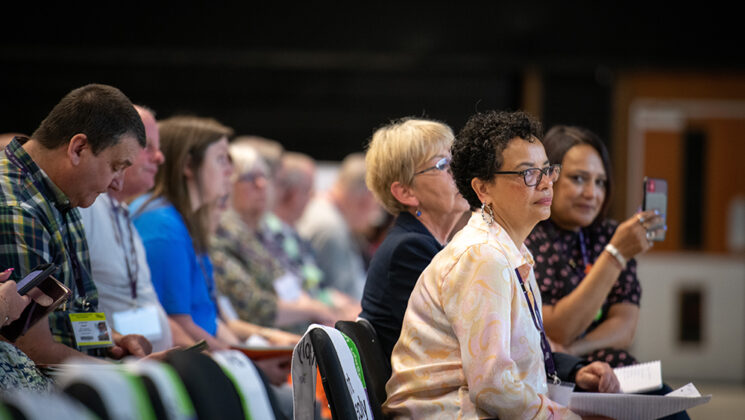There should be no profiteering from social care. That message was at the heart of a series of debates at UNISON’s local government conference in Brighton this afternoon, as delegates continued to plot the service group’s path for the year to come.
Moving a major motion on care workers for the service group executive, Sarah Barwick said that, while the pandemic has been very challenging for all local government workers, it has been particularly hard so for those “undervalued, underpaid care workers”.
They had been “ignored by most people and politicians” until the preventable deaths that followed when vulnerable people were discharged from hospital into care homes without being tested for COVID, raised awareness of their role and dedication.
She suggested that perhaps some long overdue changes would be happening given all that care workers had gone through: “But no. No”.
And a major part of the problem is that only a handful of councils across the UK have taken steps to bring care workers back in-house after their jobs were outsourced to private providers.
There was a risk of carers becoming an invisible workforce yet again, said Ms Barwick.
There was a fundamental lack of understanding of the tasks that care workers do and it is “vitally important that we remedy this situation”.
Ms Barwick said that UNISON will be leading a care worker lobby in Westminster this summer to let that workforce tell MPs about the work they do and the conditions they face.
Other delegates pointed out that the problems in care in the pandemic had been exacerbated because statutory sick pay in UK is the lowest in Europe, leaving many facing the prospect of losing money if they self-isolated.
“What was true before, and during the pandemic, is also true now: care workers need proper pay and full statutory sick pay”, said one speaker.
Jim Macfallon from Dundee, noting that “our care workers went above and beyond”, called for insourcing. Private providers are interested in one thing, he said. “Profit, to the cost of members and those needing care.
“No one should profit from care.”
The system is broken
Louise McDaid from Ayrshire pointed out that UNISON “always knew we were right when we said the system was broken”.
In Scotland, she said that the SNP has “committed to a national care service”, but the union remains concerned at the threat to remove local democratic control from care. And it was “wrong to see the likes of Price Waterhouse and KPMG given contracts to be involved in a Scottish care system”.
Sharon Nicholson from Mersey branch said that, in May, “our carers in the private sector were given a bonus of £220 to say ‘thank you’ for their work in the pandemic”.
Some carers still haven’t received it, with some companies not even telling them about it. She said: “Companies leave their staff at significant risk,” and told of how care homes are left with only one member of staff on shift overnight.
In such cases, they have been instructed to refuse to change an incontinent resident because they are the only member of staff.
“We need to protect, get recognised and get rid of these rogue traders. Our members deserve better and the people they take care of deserve better,” she concluded.
Mandy Buckley recalled the winning Birmingham strike in 2019 that ensured the maintenance of the service in that city. In the pandemic, “we had two COVID teams set up across the city”.
They went out to hospitals for discharges. She says they had to fight for the PPE, testing kits and more. The council care workers stuck together and cared for every person that came out of hospital, while the private sector care companies refused to go into any home.
“We still don’t get valued, we don’t get respected and we don’t get paid properly. We need to bring everything back in-house,” Ms Buckley said.
Conference voted to call on the executive to implement a number of measures, including:
- continue to lead the positive Future Social Care Coalition and build support for a national care service across the UK and bring all care services back in house;
- continue to ensure that social care remains a priority campaign issue within the service group;
- campaign for better funding to be given to councils across the UK in order to help fund the delivery of better quality care services and better terms and conditions for care workers.


